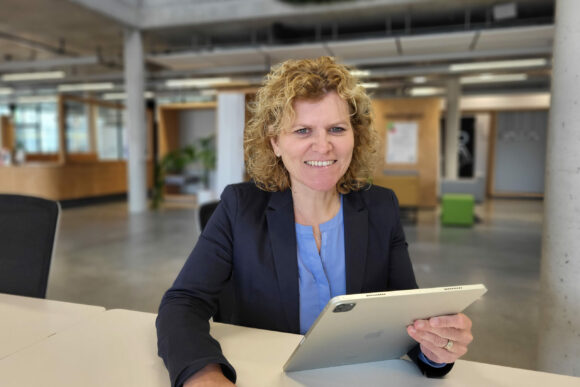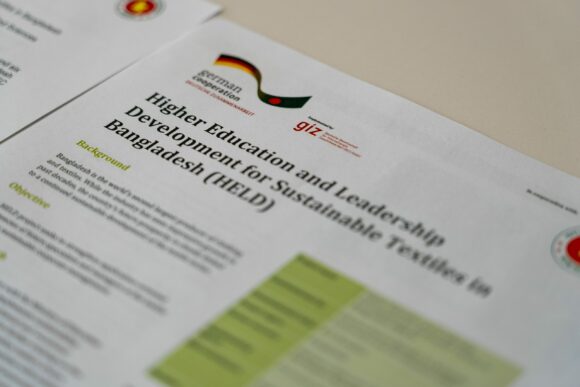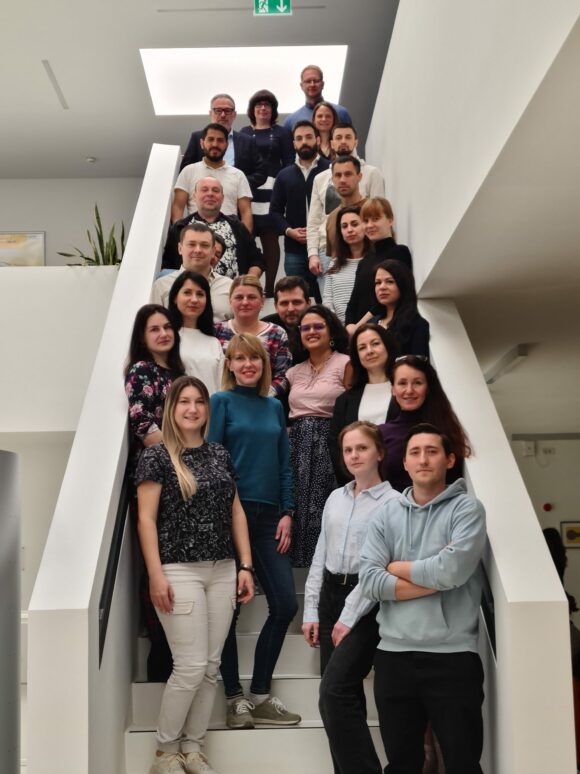In 2021, Hof University of Applied Sciences, the district of Hof and the Landesgewerbeanstalt Bayern (LGA), together with nine other partners, were selected to implement a pioneering project that aims to create digital standards for the entire European construction industry. The aim is to make private and public construction easier, faster and more efficient in the future. Technically, this is to be implemented on the basis of the European technical infrastructure GAIA-X, which the European Union wants to establish as an alternative to US providers such as Microsoft. The first successes on a regional basis have now been announced at a meeting of the project partners involved.

“GAIA-X is a project to build a competitive and trustworthy data infrastructure for Europe. It is intended to help ensure European data sovereignty and data availability,” explains Prof. Dr. Beatrix Weber, Head of the Law in Sustainability, Compliance and IT research group at the Institute for Information Systems at Hof University of Applied Sciences (iisys). Together with the district of Hof as the building permit authority and the LGA, Hof University of Applied Sciences entered the project “iECO: intelligent Empowerment of Construction Industry” in the funding competition of the Federal Ministry of Economics in a top-class consortium and was successful.
Common data room for the European construction industry
Since then, the iECO project has aimed to create a common data room for the European construction industry. With around 2.5 million employees and a turnover of 130 billion euros, the construction industry is one of the key industries in the German economy, but is still lagging far behind when it comes to digitalization:
Construction in Germany often takes far too long, there is a housing shortage in many areas and, unfortunately, all too often there is no question of resource efficiency.”
Hans-Peter Trinkl, Chairman of the LGA Executive Board
Digitalization, legal certainty and digital building passports
The aim is therefore to work together to speed up and improve the efficiency of procedures. To this end, the necessary processes and documents are to be digitized first – also to save unnecessary amounts of paper in the construction process.
It is of the utmost importance that we create more legal certainty and trust for these digital processes through legal solutions.”
Prof. Dr. Beatrix Weber
In addition, the creation of a digital building passport is to be achieved by collecting data from the building, which will then contain a wide range of information about the life cycle of public and private buildings.

First project successes
The initial progress of the project was presented at a consortium meeting at Hof University of Applied Sciences: For example, the Landesgewerbeanstalt Bayern (LGA) is currently testing the inspection process for stability in steel and timber construction using Building Information Modeling (BIM), a working method for the networked planning, construction and management of buildings using software. In a specific use case, the climbing station in Rehau, all relevant building data is digitally modeled, combined and recorded.
As Dr. Oliver Bär, District Administrator of the Hof district, announced, the Hof district, as the lower building supervisory authority, is currently conducting a process analysis with the help of smartlytic GmbH to integrate and test BIM in the approval processes.
This is another important building block on the way to digitalizing and simplifying our processes. For example, visualization in the form of 3D models can be helpful for both planning and approval.”
Dr. Oliver Bär, District Administrator of the district of Hof
As one of the first districts in Bavaria, the district of Hof has also been involved in the Bavarian Digital Building Application pilot project from the outset and is contributing its practical experience of legal issues relating to the approval process to the project.
Hof University of Applied Sciences itself has developed and tested a model in the field of rights management and data governance that enables the secure and trustworthy use of data in the construction industry – both for the private sector and for the administration. It has already been presented in numerous publications and at lectures throughout Germany.



Project partners involved
- A1 Digital Deutschland GmbH
- Fraunhofer Society for the Promotion of Applied Research e. V.
- Hof University of Applied Sciences
- Implenia Hochbau GmbH
- IPROconsult GmbH
- N P Informationssysteme GmbH
- LGA Landesgewerbeanstalt Bayern
- Software AG
- Dresden University of Technology
- District of Hof (associated partner)
- Consortium management: RIB Information Technologies AG
Project tasks in the model region Hofer Land:
- Hof University of Applied Sciences: data governance, legal framework for digitization in the construction industry, data governance and rights management BIM;
Contact person: Prof. Dr. Beatrix Weber - Landesgewerbeanstalt Bayern, LGA: Digitization of the inspection as part of the approval process;
Contact: Dr. Marcus Achenbach, Deputy Head of Inspection Office Hof - District of Hof (associated partner): Interfaces between the public sector and the construction industry to accelerate digitization, integration of BIM into the approval process;
Contact persons Mr. Frank, Ms. Schmidt







